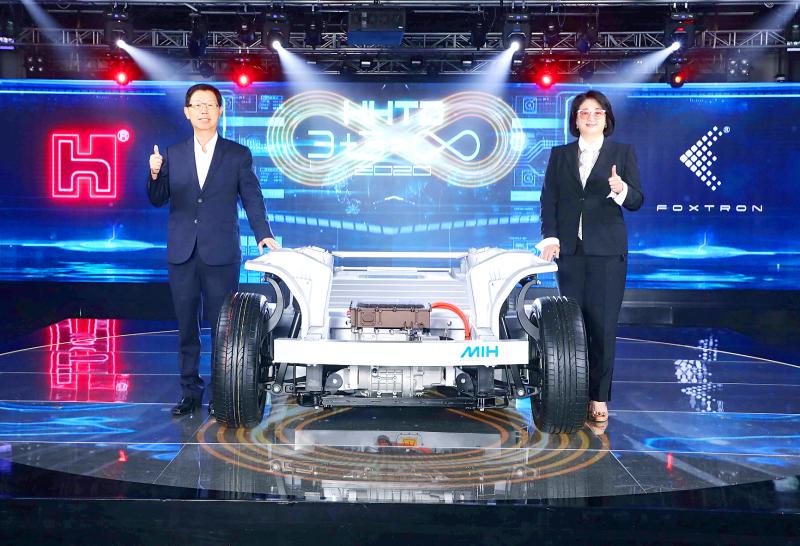Hon Hai Precision Industry Co (鴻海精密) is to develop an electric vehicle (EV) with Fisker Inc, as part of the electronics manufacturer’s efforts to boost its automotive capabilities at a time when technology companies including its main customer, Apple Inc, are looking to expand into vehicles.
The vehicle would be targeted at multiple markets, including North America, Europe, China and India, and sold under the Fisker brand, the firms said in a statement on Wednesday.
Production is set to start in the fourth quarter of 2023.

Photo courtesy of Hon Hai Precision Industry
Californai-based Fisker is looking to break new ground with its second planned model. The start-up plans to make a vehicle that does not fit into an existing segment, like a sedan or SUV.
Its partnership with Hon Hai is pinned on hopes that the collaboration would bring innovative manufacturing.
“The auto industry is very stale,” Fisker founder Henrik Fisker said in an interview.
“We still talk about adopting the Toyota manufacturing system,” he said, referring to a production and logistics concept that was developed decades ago.
Fisker plans to design and market the vehicle, while Hon Hai would supply the chassis, and manage supply chain and assembly.
That is asking a lot of a firm that has never built vehicles in large volume before.
“I have full confidence that they can do this and maybe have ideas that are outside the box,” Fisker said of Hon Hai.
Shares of Fisker rose 39 percent to a record US$22.58 at the close in New York. Hon Hai shares advanced as much as 5 percent in Taipei.
Hon Hai in October last year introduced its first-ever EV chassis and a software platform aimed at helping automakers bring models to the market faster.
This month, Hon Hai chairman Young Liu (劉揚偉) said that two light vehicles based on the platform would be unveiled in the fourth quarter.
The firm is also planning to help launch an electric bus, he said.
Hon Hai is expected to build more than 250,000 vehicles annually for the Fisker partnership, the statement said.
The manufacturer might choose to make some of them in the US, a person familiar with the matter said.
Following Wednesday’s memorandum of understanding, the two sides said that they would enter a formal agreement in the second quarter.
Fisker is the second battery-powered vehicle venture founded by its namesake founder, a longtime vehicle designer. Its debut model, the Ocean electric SUV, is scheduled to start production late next year.

‘SWASTICAR’: Tesla CEO Elon Musk’s close association with Donald Trump has prompted opponents to brand him a ‘Nazi’ and resulted in a dramatic drop in sales Demonstrators descended on Tesla Inc dealerships across the US, and in Europe and Canada on Saturday to protest company chief Elon Musk, who has amassed extraordinary power as a top adviser to US President Donald Trump. Waving signs with messages such as “Musk is stealing our money” and “Reclaim our country,” the protests largely took place peacefully following fiery episodes of vandalism on Tesla vehicles, dealerships and other facilities in recent weeks that US officials have denounced as terrorism. Hundreds rallied on Saturday outside the Tesla dealership in Manhattan. Some blasted Musk, the world’s richest man, while others demanded the shuttering of his

ADVERSARIES: The new list includes 11 entities in China and one in Taiwan, which is a local branch of Chinese cloud computing firm Inspur Group The US added dozens of entities to a trade blacklist on Tuesday, the US Department of Commerce said, in part to disrupt Beijing’s artificial intelligence (AI) and advanced computing capabilities. The action affects 80 entities from countries including China, the United Arab Emirates and Iran, with the commerce department citing their “activities contrary to US national security and foreign policy.” Those added to the “entity list” are restricted from obtaining US items and technologies without government authorization. “We will not allow adversaries to exploit American technology to bolster their own militaries and threaten American lives,” US Secretary of Commerce Howard Lutnick said. The entities

Minister of Finance Chuang Tsui-yun (莊翠雲) yesterday told lawmakers that she “would not speculate,” but a “response plan” has been prepared in case Taiwan is targeted by US President Donald Trump’s reciprocal tariffs, which are to be announced on Wednesday next week. The Trump administration, including US Secretary of the Treasury Scott Bessent, has said that much of the proposed reciprocal tariffs would focus on the 15 countries that have the highest trade surpluses with the US. Bessent has referred to those countries as the “dirty 15,” but has not named them. Last year, Taiwan’s US$73.9 billion trade surplus with the US

Prices of gasoline and diesel products at domestic gas stations are to fall NT$0.2 and NT$0.1 per liter respectively this week, even though international crude oil prices rose last week, CPC Corp, Taiwan (台灣中油) and Formosa Petrochemical Corp (台塑石化) said yesterday. International crude oil prices continued rising last week, as the US Energy Information Administration reported a larger-than-expected drop in US commercial crude oil inventories, CPC said in a statement. Based on the company’s floating oil price formula, the cost of crude oil rose 2.38 percent last week from a week earlier, it said. News that US President Donald Trump plans a “secondary